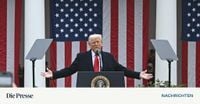US President Donald Trump has escalated his aggressive tariff policy, announcing new tariffs on a wide range of imported goods. During a speech in the Rose Garden of the White House on April 2, 2025, Trump declared the day a "liberation day" for the US economy, asserting that the new measures are necessary to protect American interests.
Beginning on April 5, 2025, at 12:01 a.m. local time (6:01 a.m. CEST), a "minimum tariff" of 10 percent will be imposed on trading partners worldwide. This move is part of a broader strategy to address what Trump describes as unfair trade practices that have harmed the US economy. He accused close trading partners of having "plundered and raped" the United States through their tariff policies.
Furthermore, starting on April 9, 2025, at 12:01 a.m. local time, higher tariffs will take effect for what the White House deems the "worst offenders." Imports from the European Union will incur a surcharge of 20 percent, while India will face a 26 percent increase, South Korea a 25 percent increase, and Japan a 24 percent increase. However, it is China that will bear the brunt of these new tariffs, facing an additional surcharge of 34 percent. This surcharge is on top of the existing 20 percent tariffs that have been in place since March 4, 2025, bringing the total tariff on Chinese imports to an eye-watering 54 percent.
Some goods, such as copper, medicines, semiconductors, wood, gold, and certain minerals, will be exempt from these tariffs. Notably, Canada and Mexico have been excluded from the new tariffs, despite previous 25 percent tariffs on imports from these countries still being enforced.
In addition to these measures, new tariffs of 25 percent on auto imports will come into effect on April 3, 2025. Trump has previously imposed similar tariffs on steel and aluminum imports, which will now also apply to beer cans and empty aluminum containers. White House officials indicated that similar actions might be considered for semiconductors, medicines, and potentially crucial minerals.
Moreover, a significant penalty tariff of 25 percent has been implemented for countries importing oil and gas from Venezuela since April 2, 2025. This decision is expected to impact China and India, as Venezuela has redirected some of its exports to these nations amid US sanctions.
Trump has also threatened to impose a similar penalty tariff on buyers of Russian oil if no resolution is reached regarding the ongoing conflict in Ukraine. In a separate directive, he announced the elimination of tariff exemptions for smaller packages from China, effective May 2, 2025. This change will particularly affect online platforms based in China, such as Shein and Temu, which have benefited from these exemptions. A customs rate of either 30 percent of the package's value or $25 per item will now be levied, with plans to increase that amount to $50 per item after June 1, 2025.
As for the specific punitive tariffs on various countries, they will be as follows: Algeria at 30 percent, Argentina at 10 percent, Australia at 10 percent, Bahamas at 10 percent, Bahrain at 10 percent, Bangladesh at 37 percent, Bolivia at 10 percent, Bosnia and Herzegovina at 35 percent, Botswana at 37 percent, Brazil at 10 percent, Brunei at 24 percent, Cambodia at 49 percent, Chile at 10 percent, China at 34 percent, Colombia at 10 percent, Costa Rica at 10 percent, Ivory Coast at 21 percent, Dominican Republic at 10 percent, Ecuador at 10 percent, Egypt at 10 percent, El Salvador at 10 percent, Ethiopia at 10 percent, European Union at 20 percent, Fiji at 32 percent, Guatemala at 10 percent, Guyana at 38 percent, Haiti at 10 percent, Honduras at 10 percent, Iceland at 10 percent, India at 26 percent, Indonesia at 32 percent, Israel at 17 percent, Japan at 24 percent, Jordan at 20 percent, Kazakhstan at 27 percent, Kenya at 10 percent, Laos at 48 percent, Lesotho at 50 percent, Liechtenstein at 37 percent, Madagascar at 47 percent, Malaysia at 24 percent, Mauritius at 40 percent, Morocco at 10 percent, Myanmar at 44 percent, Namibia at 21 percent, New Zealand at 10 percent, Nicaragua at 18 percent, Nigeria at 14 percent, North Macedonia at 33 percent, Norway at 15 percent, Oman at 10 percent, Pakistan at 29 percent, Panama at 10 percent, Peru at 10 percent, Philippines at 17 percent, Qatar at 10 percent, Saudi Arabia at 10 percent, Serbia at 37 percent, Singapore at 10 percent, South Africa at 30 percent, South Korea at 25 percent, Sri Lanka at 44 percent, Switzerland at 31 percent, Taiwan at 32 percent, Thailand at 36 percent, Trinidad and Tobago at 10 percent, Tunisia at 28 percent, Turkey at 10 percent, Ukraine at 10 percent, United Arab Emirates at 10 percent, United Kingdom at 10 percent, Uruguay at 10 percent, and Venezuela at 15 percent.
In response to the announcement, Liechtenstein's Prime Minister Daniel Risch expressed disappointment, stating on social media that the tariff decisions are "less surprising than regrettable." He emphasized that they represent a significant breach of internationally accepted trade rules and could harm the economy and jobs. He further noted that these tariffs undermine the principles of economic liberalism that Liechtenstein stands for.
Switzerland's government responded cautiously, with President Karin Keller-Sutter acknowledging the tariff decisions and stating that the Federal Council will quickly determine the next steps to protect the long-term economic interests of the country. She reaffirmed that adherence to international law and free trade remains central values for Switzerland.
While Trump failed to elaborate on the rationale behind the specific tariffs during his lengthy speech, he claimed that duties on Swiss imports should ideally be 61 percent if equal treatment were applied. However, it remains unclear whether pharmaceuticals, precious metal bars, and aluminum products will be included in the exemption from these tariffs, as the documentation provided by the White House was vague and caused confusion, even among pharmaceutical representatives.


